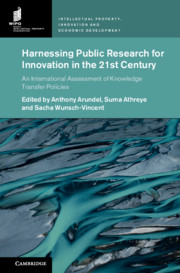Knowledge produced or built on by public research organizations such as universities and public research institutes is a vital source of new technologies and organizational methods that can contribute to many of the United Nations’ sustainable development goals, from improvements in food security and health and a reduction in carbon emissions to economic growth. To achieve social and economic benefits of value to these development goals, relevant knowledge needs to be successfully transferred from public research organizations to firms and government organizations that can use the knowledge to improve or create new services, goods or processes.
Knowledge transfer is a complex process that involves multiple actors and channels for transmitting knowledge. The six case studies in this book for three middle-income and three high-income countries illustrate how the design of policies to support knowledge transfer needs to take into consideration the absorptive capabilities of domestic firms, the research capabilities of universities and public research institutes, and the skills of knowledge transfer professionals. For middle-income countries, in particular, these capabilities and skills are in flux. The case studies show how policies and practices to support knowledge transfer need to both promote capabilities and skills and adapt to changing conditions.
The value of this book lies in its implications for policies and practices to support knowledge transfer and in its practical recommendations to collect a comprehensive set of metrics to ensure that all forms of knowledge transfer, both formal and informal, are placed in perspective. The problems associated with a narrow set of metrics focused on patent licensing have been known for some time. This book provides evidence for why a broader set of metrics, covering contractual, consulting, and informal channels, is important to prevent undue emphasis on some forms of knowledge transfer over others.
UNU-MERIT has been pleased to support some of the work behind this book, both through the contributions of Anthony Arundel and by hosting a workshop in Maastricht in March 2017 to discuss the conceptual framework provided in Chapter 2 and the six case studies in Chapters 4 to 9. The results should be of value both to future research on knowledge transfer and to the design of policies and practices that are adapted to specific conditions within countries and within individual universities or research institutes.

